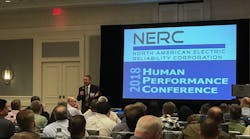Achieving Operational Excellence through a Focus on Human Performance
Humans are fallible. Even the very best people will make mistakes. In the world of electric reliability, mistakes can lead to cascading outages, equipment damage, injury, and in some cases, loss of life. This knowledge is at the root of the North American Electric Reliability Corporation’s annual human performance conferences.
Human error is often cited as the cause for up to 80 percent of all incidents and accidents in complex, high-risk systems that exist in the aviation, petrochemical, healthcare, construction, mining, and nuclear power industries. Many of the major events that occur in the bulk power system are initially labeled as being caused by individual human error. When the causes of these human errors are broken down further, they reveal that the majority of the errors associated with events stem from latent organizational weaknesses, which are not attributable to one individual. Through careful and thorough analysis of events and near-misses, and most importantly, the subsequent understanding of the root and contributing causes, organizations can prevent future occurrences.
Sound administrative and cultural controls can withstand human error. However, these controls are weakened when conditions are present that provoke error. Eliminating error precursors at the job site, workplace, or organization reduces the frequency or numbers of active errors. Events can be avoided through an understanding of the reasons mistakes occur and application of the lessons learned from past events and near misses. Systematic investigation and evaluation of events in the bulk power system are uncovering many of the latent errors that are dormant in the system.
NERC’s Reliability Risk Management group analyzes events and addresses the most significant risks to bulk power system reliability, ensuring that industry is well informed of system events, emerging trends, risk analysis, lessons learned, and expected actions. Through the events analysis initiative and the use of human performance analyses and applications, lessons learned and good practices are being applied across industry to further improve the reliability of the bulk power system. A solid understanding and application of human performance fundamentals is essential to the reliable operation of the grid.
Human Performance Conference
This year marked the seventh annual Human Performance Conference – Improving Human Performance on the Grid – hosted by NERC and the North American Transmission Forum (NATF). The event drew a record 380 participants from more than 180 organizations across North America. The three-day conference, which focuses on human performance and good industry practices, brings together subject matter experts and stakeholders in an idea-sharing, cooperative forum focused on improving human performance on the bulk power system. The goal is to shift the focus from a culture of blame to one that views human performance challenges from a strategic, operational, and tactical level and then puts the mitigation or defenses at the appropriate level.
'Just Culture' Model
The conference kicked off on March 27, 2018, with a panel discussion on how to build and sustain a “just culture,” which focuses on the real-time evaluation of behavioral choices in a rational and organized manner within a company. Under the just culture model, creating an open, fair, and “just culture” relies on developing managerial competencies that appropriately hold individuals accountable for their behaviors and openly investigating the behavior that led to the error, with a purpose to fix the system, not necessarily the individual.
This model acknowledges the tendency to blame the person when an error occurs, thereby making them less likely to take responsibility. The goal should not be to punish the worker who made the error, but rather to get to the root issue. Is it organizational? A process issue? A just culture allows continuous improvement and learning as front-line employees are encouraged to bring challenges forward and be a part of the process for system enhancement.
Human Resources departments tend to punish the employee because their policies are in place to protect the institution, rather than the individual. The just culture model provides a more scaled response, independent of the outcome: Console the human error. Coach the at-risk behavior. Punish the reckless behavior. Just culture addresses the error then moves on to the task of building a better system that will produce a better outcome with a goal of operational excellence.
NERC recognizes the crucial role human performance plays in grid reliability. The electric grid is a complex and high-risk system. Embracing the principles of a just culture moves reliability organizations toward a culture of high reliability, further contributing to continuous learning and improvement of accountability and bulk power system reliability.
This annual conference is an opportunity for industry members to come together, interact, and improve their individual and organizational abilities as well as honor the role that people play daily in the operation of the transforming electric grid. Presentations from the seventh annual Human Performance Conference will be posted to the NERC website within two weeks. Resources from the past six conferences are available here.


